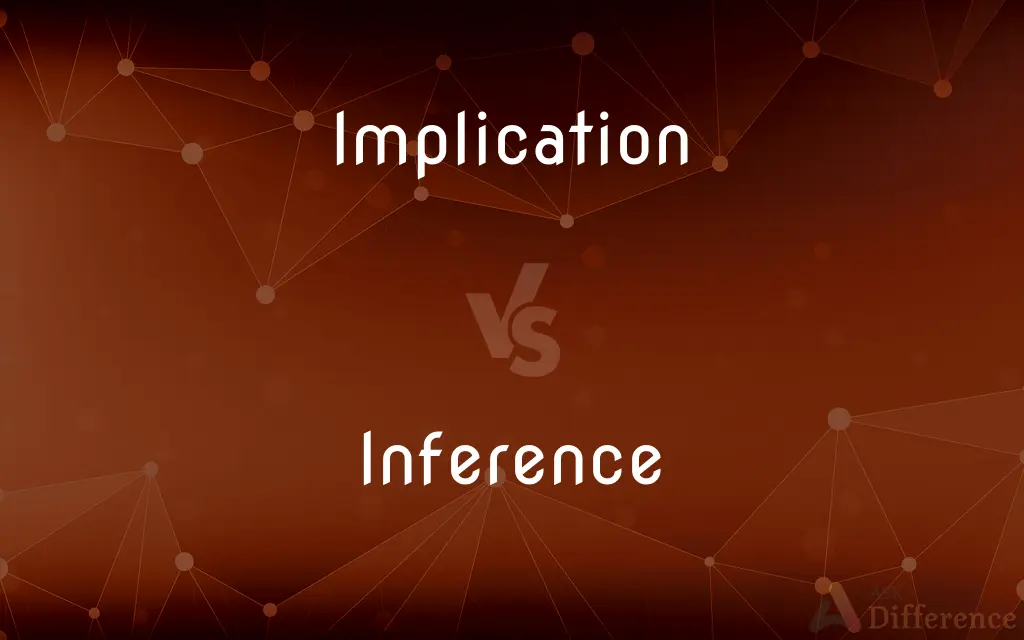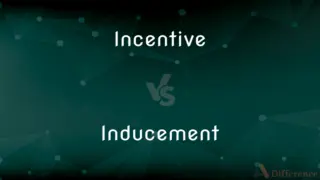Implication vs. Inference — What's the Difference?
By Maham Liaqat & Fiza Rafique — Updated on March 29, 2024
Implication involves a suggestion or indication not explicitly stated, relying on context and reasoning. Inference is the process of deducing conclusions from premises or evidence, highlighting logical or analytical reasoning.

Difference Between Implication and Inference
Table of Contents
ADVERTISEMENT
Key Differences
Implication is a concept where information or meaning is implied rather than directly communicated, requiring the receiver to deduce the unstated message. It often relies on shared knowledge or context to convey a message without explicit statement. For example, if a speaker says, "It's getting late," the implication might be that it's time to leave, depending on the context. Whereas inference is the cognitive process in which an individual arrives at a conclusion based on the evaluation of available evidence and prior knowledge. In the previous example, the listener's decision that it's time to leave is an inference made from the speaker's statement.
Implications are inherent in communication, often serving as a subtle or nuanced way to convey messages, beliefs, or intentions. They play a critical role in both verbal and non-verbal communication, enabling speakers to suggest outcomes or intentions indirectly. On the other hand, inferences require active cognitive engagement, where the listener or observer analyzes the implied information to draw conclusions, demonstrating a key aspect of critical thinking and reasoning.
In literature and art, implications enrich narratives by adding layers of meaning that readers or viewers must interpret through inference. This interplay enhances the depth of storytelling, allowing audiences to derive personal insights or conclusions. Conversely, inference in these contexts involves piecing together implied messages, themes, or motifs to form a coherent understanding of the work, often leading to varied interpretations among different individuals.
In the realm of logic and argumentation, implications are statements that, if true, logically lead to another conclusion without direct assertion. This logical structure forms the basis for constructing arguments and testing hypotheses. Inferences, on the other hand, are the conclusions drawn from these logical structures, requiring the observer to connect premises to reach a logical conclusion, highlighting the deductive or inductive reasoning process.
In scientific research, the implication of a study refers to the potential consequences or significance of the research findings for theory, practice, or further study. It suggests how the findings might be applied or understood in a broader context. Inference, in scientific terms, involves the process of drawing conclusions from data and evidence, applying statistical and methodological tools to derive insights from experimental or observational studies.
ADVERTISEMENT
Comparison Chart
Definition
A suggestion or indication not explicitly stated
The act of deducing conclusions from evidence
Communication Role
Conveys messages indirectly
Involves analyzing implications to draw conclusions
Cognitive Process
Requires interpretation of unstated messages
Requires evaluation of evidence and reasoning
Usage in Literature
Adds layers of meaning
Allows for personal insights and varied interpretations
Role in Logic
Statements leading logically to a conclusion
Conclusions drawn from logical statements
Application in Science
Suggests broader significance of findings
Drawing conclusions from data and evidence
Compare with Definitions
Implication
A message or meaning suggested without being directly stated.
The dark clouds imply rain is coming.
Inference
Drawing a conclusion based on evidence.
From the evidence, we infer the suspect's guilt.
Implication
Indirect indication of beliefs or intentions.
His tone implied dissatisfaction.
Inference
Deductive reasoning from general premises to a specific case.
If all birds fly, and a sparrow is a bird, we infer that sparrows fly.
Implication
Subtle hint conveyed through context.
The closed door implies a private meeting is in progress.
Inference
Inductive reasoning from specific cases to general conclusions.
Observing multiple sunrises, we infer the sun rises every morning.
Implication
A potential outcome suggested by actions or statements.
The CEO's resignation implies changes in the company.
Inference
Interpretation of implied messages.
From his hesitation, we infer reluctance.
Implication
Consequence suggested by a study's findings.
The research implies a link between diet and health.
Inference
Analysis leading to insights in scientific research.
We infer a causal relationship from the correlation observed.
Implication
The conclusion that can be drawn from something although it is not explicitly stated
The implication is that no one person at the bank is responsible
Inference
Inferences are steps in reasoning, moving from premises to logical consequences; etymologically, the word infer means to "carry forward". Inference is theoretically traditionally divided into deduction and induction, a distinction that in Europe dates at least to Aristotle (300s BCE).
Implication
The action or state of being involved in something
Our implication in the problems
Inference
A conclusion reached on the basis of evidence and reasoning
It seemed a fair inference that such books would be grouped together
Researchers are entrusted with drawing inferences from the data
Implication
The act of implicating or the condition of being implicated.
Inference
The act or process of deriving logical conclusions from premises known or assumed to be true.
Implication
The act of implying or the condition of being implied.
Inference
The act of reasoning from factual knowledge or evidence.
Implication
An indirect indication; a suggestion.
Inference
Something inferred.
Implication
An implied meaning; implicit significance.
Inference
Usage Problem A hint or suggestion
The editorial contained an inference of foul play in the awarding of the contract. See Usage Note at infer.
Implication
An inference. See Usage Note at infer.
Inference
(uncountable) The act or process of inferring by deduction or induction.
Implication
(uncountable) The act of implicating.
Inference
(countable) That which is inferred; a truth or proposition drawn from another which is admitted or supposed to be true; a conclusion; a deduction.
Implication
(uncountable) The state of being implicated.
Inference
The act or process of inferring by deduction or induction.
Though it may chance to be right in the conclusions, it is yet unjust and mistaken in the method of inference.
Implication
(countable) A possible effect or result of a decision or action.
Inference
That which inferred; a truth or proposition drawn from another which is admitted or supposed to be true; a conclusion; a deduction.
These inferences, or conclusions, are the effects of reasoning, and the three propositions, taken all together, are called syllogism, or argument.
Implication
An implying, or that which is implied, but not expressed; an inference, or something which may fairly be understood, though not expressed in words.
Inference
The reasoning involved in drawing a conclusion or making a logical judgment on the basis of circumstantial evidence and prior conclusions rather than on the basis of direct observation
Implication
The connective in propositional calculus that, when joining two predicates A and B in that order, has the meaning "if A is true, then B is true".
Implication
Logical consequence. en
Implication
The act of implicating, or the state of being implicated.
Three principal causes of firmness are. the grossness, the quiet contact, and the implication of component parts.
Implication
An implying, or that which is implied, but not expressed; an inference, or something which may fairly be understood, though not expressed in words.
Whatever things, therefore, it was asserted that the king might do, it was a necessary implication that there were other things which he could not do.
Implication
Something that is inferred (deduced or entailed or implied);
His resignation had political implications
Implication
A meaning that is not expressly stated but can be inferred;
The significance of his remark became clear only later
The expectation was spread both by word and by implication
Implication
An accusation that brings into intimate and usually incriminating connection
Implication
A logical relation between propositions p and q of the form `if p then q'; if p is true then q cannot be false
Implication
A relation implicated by virtue of involvement or close connection (especially an incriminating involvement);
He was suspected of implication in several robberies
Common Curiosities
How does inference work?
Inference is the process of drawing conclusions from available information, evidence, or premises through logical reasoning.
What is an implication?
An implication is an indirectly suggested message or meaning, requiring interpretation beyond explicit statements.
How are inferences used in science?
In science, inferences are drawn from data and evidence, using methodological tools to derive conclusions and insights.
What role do implications play in communication?
Implications enrich communication by allowing subtlety, suggesting messages or meanings without direct statements.
How is inference different from assumption?
Inference is a reasoned conclusion based on evidence, while an assumption is accepted without evidence.
Can implications be intentional?
Yes, speakers or writers often intentionally use implications to convey messages indirectly.
Why are inferences important in literature?
Inferences allow readers to derive deeper meanings, themes, and interpretations from literary works.
Do implications always lead to correct inferences?
Not always; correct inferences depend on the accurate interpretation of implications and the context in which they are made.
What skills improve inference making?
Critical thinking, logical reasoning, and an understanding of context and evidence improve inference-making skills.
Are there tools to help identify implications?
While no specific tools exist, knowledge of language cues, context, and critical thinking aids in identifying implications.
How do implications and inferences relate to each other?
Implications provide the suggested messages that inferences are drawn from, linking them in the communication process.
Can an inference be incorrect?
Yes, inferences can be incorrect if based on faulty logic, insufficient evidence, or misinterpretation of implications.
How do implications affect relationships?
Misinterpreted implications can lead to misunderstandings, while correctly interpreting them can enhance communication and understanding.
What makes an inference strong or weak?
The strength of an inference depends on the quality and amount of evidence, as well as the logical connection to the conclusion.
Can implications be non-verbal?
Yes, non-verbal cues like gestures or facial expressions can imply messages that require inference to interpret.
Share Your Discovery

Previous Comparison
Ligament vs. Joint
Next Comparison
Incentive vs. InducementAuthor Spotlight
Written by
Maham LiaqatCo-written by
Fiza RafiqueFiza Rafique is a skilled content writer at AskDifference.com, where she meticulously refines and enhances written pieces. Drawing from her vast editorial expertise, Fiza ensures clarity, accuracy, and precision in every article. Passionate about language, she continually seeks to elevate the quality of content for readers worldwide.














































